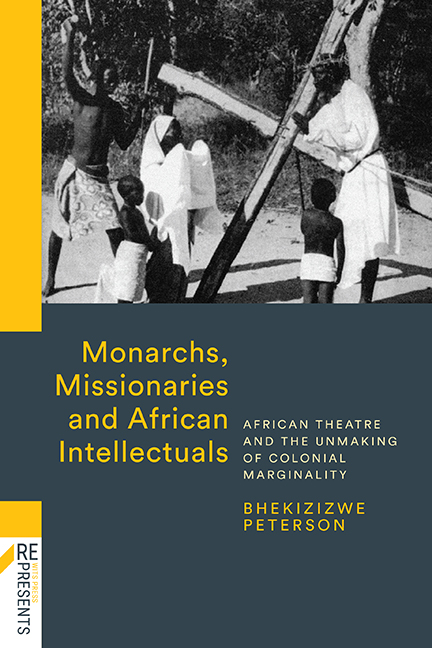 Monarchs, Missionaries and African Intellectuals
Monarchs, Missionaries and African Intellectuals Book contents
- Frontmatter
- Dedication
- Contents
- Preface and Acknowledgements
- Note on Zulu Orthography
- Introduction: Staging the (Alien)nation: African Theatre and the Colonial Experience
- 1 ‘All Work and No Play Makes Civilisation Unattractive to the Masses’: Theatre and Mission Education at Mariannhill
- 2 ‘I Will Open My Mouth in Parables’:Accounting for the Crevices in Redemption
- 3 Parallel Time, Parallel Signs, Discordant Interpretations
- 4 B.W. Vilakazi and the Poetics of the Mental War Zone
- 5 The Bantu Men’s Social Centre: Meeting the Devil on his own Ground
- 6 The Bantu Dramatic Society According to a Gossip Columnist
- 7 Contesting ‘The Bantu Imagination’: The British Drama League & The New Africans
- 8 H.I.E. Dhlomo: Measuring the Distance Between Armageddon and Revolution
- 9 ‘The Black Bulls’: Assembling the Broken Gourds
- 10 Hegemony and Identity: What a Difference ‘Play’ Makes
- Notes
- Bibliography
- Index
9 - ‘The Black Bulls’: Assembling the Broken Gourds
Published online by Cambridge University Press: 12 October 2021
- Frontmatter
- Dedication
- Contents
- Preface and Acknowledgements
- Note on Zulu Orthography
- Introduction: Staging the (Alien)nation: African Theatre and the Colonial Experience
- 1 ‘All Work and No Play Makes Civilisation Unattractive to the Masses’: Theatre and Mission Education at Mariannhill
- 2 ‘I Will Open My Mouth in Parables’:Accounting for the Crevices in Redemption
- 3 Parallel Time, Parallel Signs, Discordant Interpretations
- 4 B.W. Vilakazi and the Poetics of the Mental War Zone
- 5 The Bantu Men’s Social Centre: Meeting the Devil on his own Ground
- 6 The Bantu Dramatic Society According to a Gossip Columnist
- 7 Contesting ‘The Bantu Imagination’: The British Drama League & The New Africans
- 8 H.I.E. Dhlomo: Measuring the Distance Between Armageddon and Revolution
- 9 ‘The Black Bulls’: Assembling the Broken Gourds
- 10 Hegemony and Identity: What a Difference ‘Play’ Makes
- Notes
- Bibliography
- Index
Summary
H I.E. Dhlomo wrote approximately twenty-four plays which persistently sought to order history out of the fragmented South African landscape, its silences, tensions and contradictions. Between 1936 and 1937 he wrote five plays based on the lives of ‘great’ African leaders. Dhlomo called four of the plays – Shaka, Mfolozi (both presumably lost), Dingane and Cetshwayo – compositely ‘The Black Bulls’. The fifth historical play, Moshoeshoe, seems to be the only one performed by the Bantu Dramatic Society. The dyadic allegorical metaphors that underlie ‘The Black Bulls’ reconstruct the precolonial past as an object worthy of knowledge in its own right while the signification of lost glories serves to damn the inequities of the present. For such signification to be plausible, the dramatic locale is the outer regions of the contact zones where inhabitants experienced the anxieties of transition. The ambiguities of conquest allow the narratives to journey outwards to the past as it is remembered and onwards to the future as it is imagined. Low has described such texts as narratives of enchantment which ‘may be read forwards as an inheritance, or backwards as memory and history’. No unsullied realm, whether traditional or colonial, will do, since both are shot through with the destabilising presence and threatening intentions of the other. The deeper structures of all Dhlomo's historical plays show that they are set in the interregnum of time and of place, a geography and temporality that is saturated with conflicts, paradoxes and ‘morbid symptoms’ since ‘the old is dying and the new cannot be born’.
‘The Black Bulls’ mark a decisive and sophisticated expression of nationalism in the plays of Dhlomo. A reading of his early journalism reveals Dhlomo as manifesting definite nationalist ideas as early as 1930. Yet his first play, published in 1935, The Girl Who Killed to Save (hereafter The Girl) has been repudiated for reflecting the wholesale ‘assimilation’ of colonial discourses. In contrast, ‘The Black Bulls’ are touted as marking a fundamental, nationalist break with the political credulity and assimilationism of the first two plays. While there is enough evidence in both The Girl and Ntsikana, Dhlomo's second play, to substantiate such interpretations, they do suggest a rather stark development in Dhlomo's ideology that is not corroborated by the nationalism evident in his early articles and plays, nor by the liberal democratic ideals that frame much of ‘The Black Bulls’ and his later texts.
- Type
- Chapter
- Information
- Monarchs, Missionaries and African IntellectualsAfrican Theatre and the Unmaking of Colonial Marginality, pp. 205 - 230Publisher: Wits University PressPrint publication year: 2021


